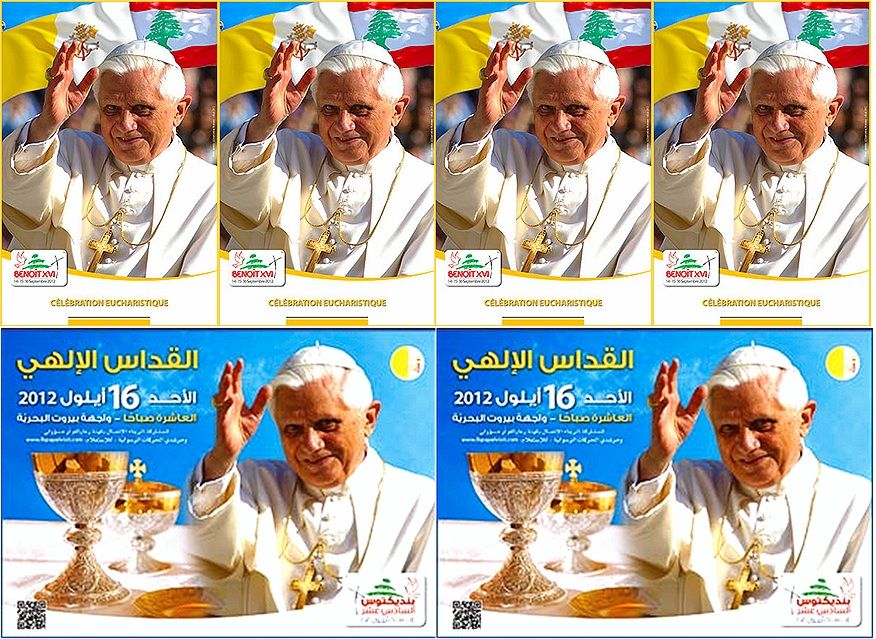 Day 3
Day 3
HOLY MASS, PRESENTATION OF
'ECCLESIA IN MEDIO ORIENTE' AND ANGELUS
Beirut Waterfront
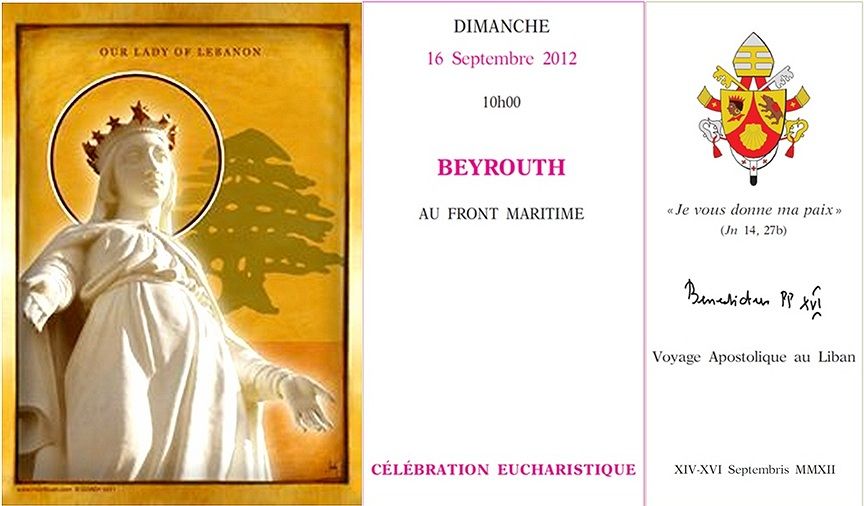
 Pope appeals for peace
Pope appeals for peace
at huge Beirut seafront Mass

Sept. 16, 2012
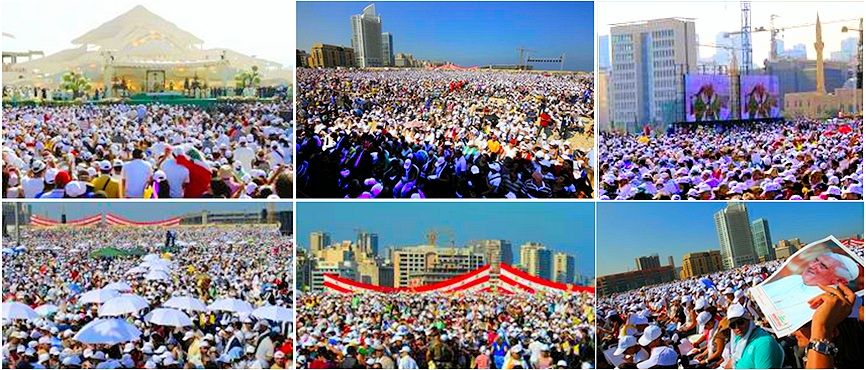
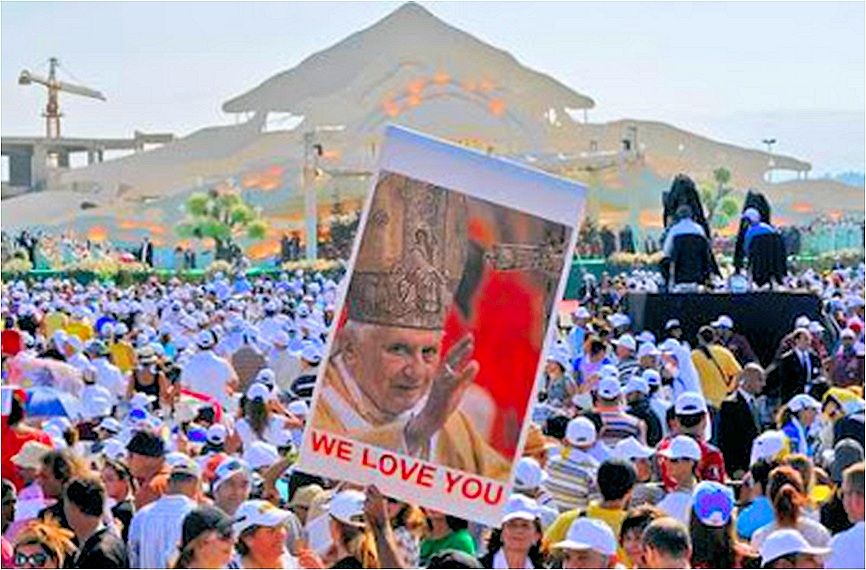
Hundreds of thousands of worshippers attended a seafront Mass in Beirut on the concluding day of Pope Benedict XVI's visit to Lebanon.
The Pope appealed for leaders in the Middle East to work for peace and reconciliation and urged those at the service to "be peacemakers".
He also renewed his call for a end to the violence in neighbouring Syria.
The Pope's visit has also coincided with anti-US protests across the region over a film deemed insulting to Islam.
It is the first papal trip to Lebanon since John Paul II went there in 1997.
An estimated 350,000 worshippers gathered for the waterfront Mass.
[Organizers had expected a maximum 75,000.]They waved flags and cheered as the Pope made his way through the crowd in his bullet-proof popemobile.
During the service, he urged Christians throughout the Middle East to do their part to end "the grim trail of death and destruction" in the region.
Calling again for peace in Syria, he said: "I appeal to the Arab countries, that, as brothers, they might propose workable solutions respecting the dignity, the rights and the religion of every human person."
Christians from around Lebanon, as well as Syria, Iraq and further afield, travelled to see him speak in what must have been a very thrilling day, the BBC's Jim Muir in Beirut says.
On Saturday the Pontiff met Lebanese political leaders at the presidential palace near Beirut.
Lebanon's politicians are bitterly divided over the conflict in neighbouring Syria, but the Pope met leaders from across the spectrum, including the Shia Muslim movement Hezbollah.
Addressing an audience of government officials, foreign diplomats and religious leaders, he called for the "fundamental right" of religious freedom to be observed.
Earlier in his visit, the Pope condemned religious fundamentalism and called on all religious leaders in the Middle East "to do everything possible to uproot this threat".
Controversy over a film deemed to be offensive to the Prophet Mohammed has provoked protests throughout the region since the Pope's arrival in Lebanon.
The film, Innocence of Muslims, is believed to have been made by a Coptic Christian in the US, and related unrest has led to the death of, among others, the US ambassador to Libya.
The Pope also addressed a gathering of thousands of young people on Saturday, and urged them to stay in Lebanon "and take your place in society and in the Church".
The number of Christians in the region has been greatly reduced in recent years due to political upheaval and economic pressures.
Pope decries Syria ‘horror’
at open-air Mass in Beirut

BEIRUT, Sept. 16 (AP) - — Pope Benedict XVI made a sweeping appeal Sunday for peace in Syria and the Middle East, decrying the violence “which generates so much suffering.”
Speaking at an open-air Mass before a huge crowd, he urged the international community and Arab countries in particular to find a solution to end the conflict in neighboring Syria.
“Why so much horror? Why so many dead,” Benedict said, lamenting that “the first victims are women and children.”
With pilgrims from across the Middle East in the crowd he said Christians must do their part to end the “grim trail of death and destruction” in the region.
“I appeal to you all to be peacemakers,” Benedict said.
Benedict spoke from an altar built on land reclaimed with debris from Lebanon’s 1975-1990 civil war, pressing ahead with his call for peace and reconciliation between Christians and Muslims.
The Rev. Federico Lombardi, a Vatican spokesman, said local organizers put the crowd at some 350,000 people.
Benedict said that justice and peace are needed in building “a fraternal society, for building fellowship.”
The 85-year pope, wearing green vestments, appeared to be holding up well in the Mediterranean heat.
Helicopters flew overhead and soldiers set up roadblocks and patrolled streets in downtown Beirut.
The crowd cheered and waved tiny Vatican and Lebanese flags as Benedict arrived in his bullet-proof popemobile at the Mass site on the Beirut waterfront.
Benedict has been appealing for tolerance and religious freedom.
The papal visit comes amid soaring sectarian tensions in the region, exacerbated by the conflict in Syria, which is in the throes of an 18-month-old civil war. At a meeting with young people Saturday evening, the Pope said he admired the courage of Syrian youth and that he did not forget their suffering.
Representatives from Lebanon’s many mostly religious groups attended.
Patriarch Bechara al-Rai, head of the Maronite Catholic Church, told the pope shortly before the Mass started, “Your visit is a safety valve at a time when Christians feel the instability and are faithfully resisting to confirm they are deep-rooted in this land despite the major challenges.”
Many Christians in the Middle East are uneasy at the Arab Spring, which has led to the strengthening of Islamist groups in most countries that have experienced uprisings.
Nawaf al-Moussawi, a representative of the Shiite Islamist militant group Hezbollah who attended the Mass, told Lebanon’s leading LBC TV: “Our message is that we want to work together for a Middle East and a region where religions and sects live on the basis of justice that lead to peace.
“What we complain about in the region today is that we are suffering from the injustice of colonial policies,” al-Moussawi added in an apparent reference to U.S. policies. “We only see its fleets.” Hezbollah is allied with Syria, which blames an alleged Western and Arab conspiracy for its woes.
The U.S. considers Hezbollah a terrorist organization. Spokesman Lombardi declined to say what the Vatican’s position is on the group.
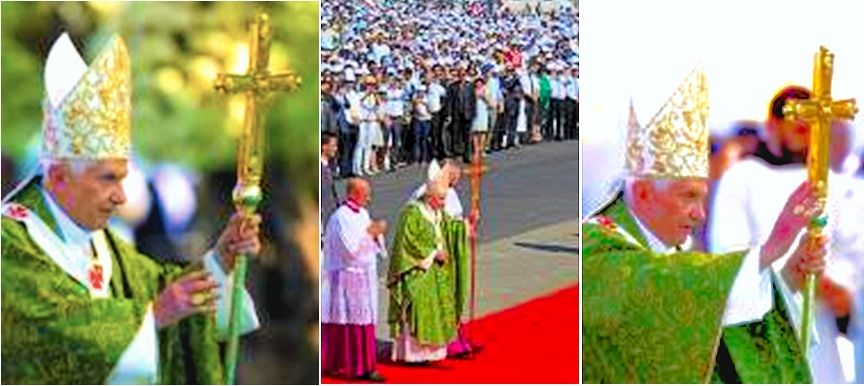
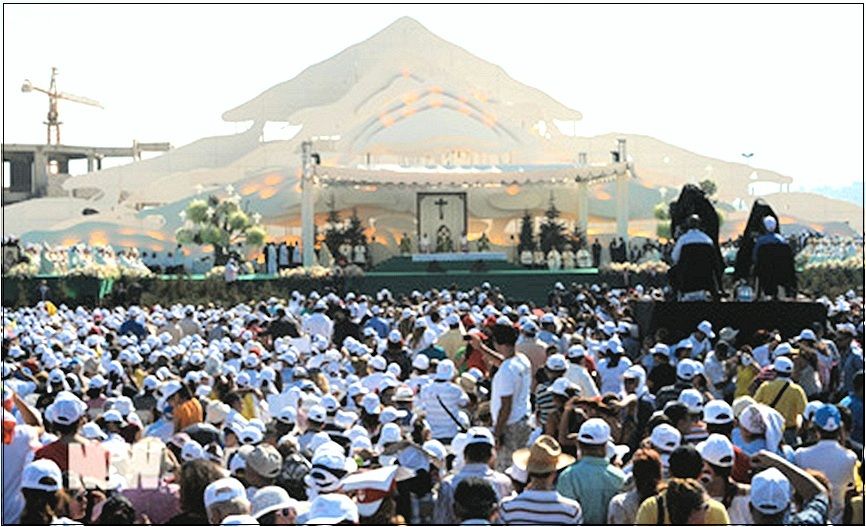
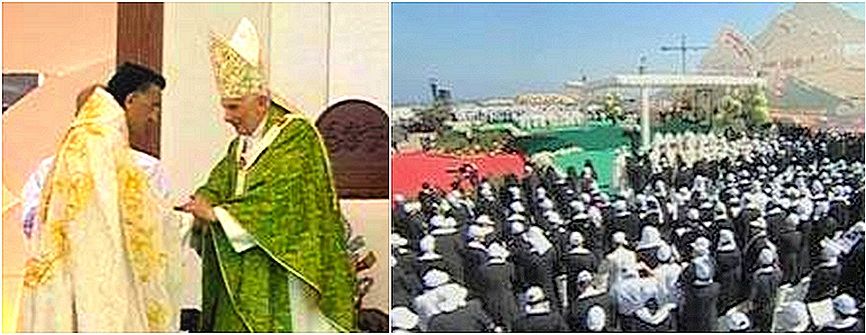
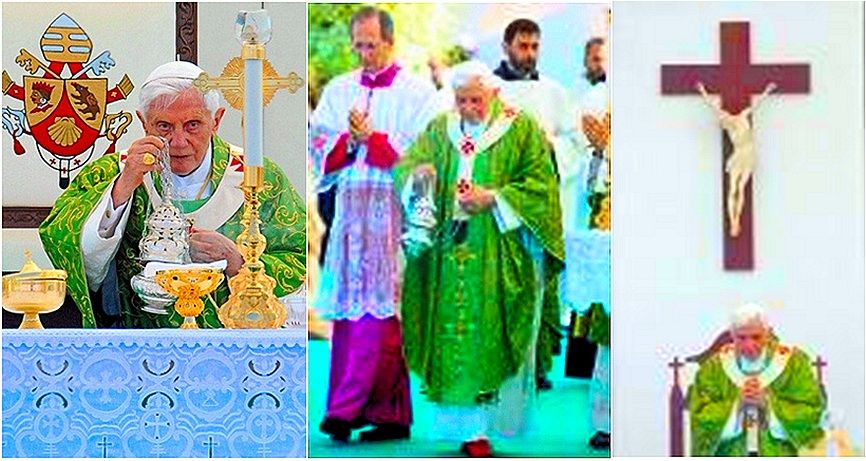
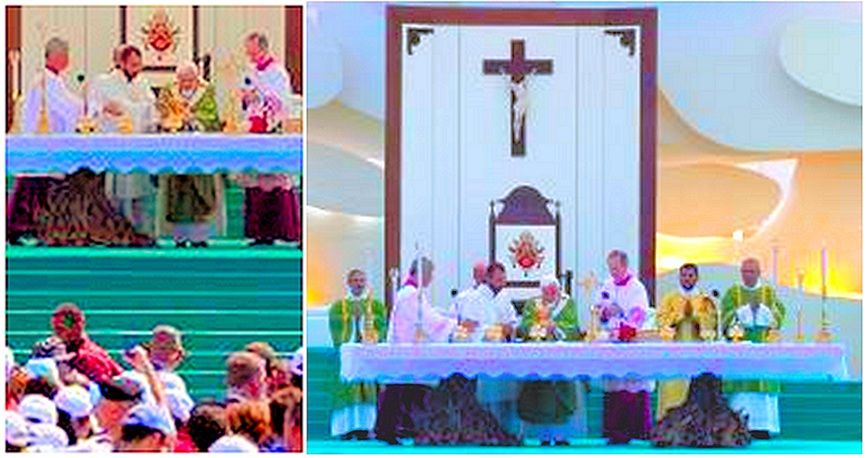
Here is the official English translation of the Pope's homily:
Dear Brothers and Sisters,
“Blessed be God, the Father of our Lord Jesus Christ!” (Eph 1:3).
Blessed be God on this day when I have the joy of being here with you, in Lebanon, to consign to the Bishops of the region my Post-Synodal Apostolic Exhortation Ecclesia in Medio Oriente!
I offer heartfelt thanks to His Beatitude Bechara Boutros Raï for his kind words of welcome. I greet the other Patriarchs and Bishops of the Eastern Churches, the Latin Bishops of the neighbouring regions, and the Cardinals and Bishops who have come from other countries.
I greet all of you with great affection, dear brothers and sisters from Lebanon and from throughout this beloved region of the Middle East, as you join with the Successor of Peter in celebrating Jesus Christ crucified, dead and risen.
My respectful greeting goes also to the President of the Republic, to the Lebanese authorities, and to the leaders and followers of the other religious traditions who have elected to be present this morning.
On this Sunday when the Gospel asks us about the true identity of Jesus, we find ourselves transported with the disciples to the road leading to the villages around Caesarea Philippi. Jesus asks them: “Who do you say that I am?” (Mk 8:29).
The moment he chose to ask this question is not insignificant. Jesus was facing a decisive turning-point in his life. He was going up to Jerusalem, to the place where the central events of our salvation would take place: his crucifixion and resurrection. In Jerusalem too, following these events, the Church would be born.
And at this decisive moment, Jesus first asks his disciples: “Who do men say that I am?” (Mk 8:27). They give very different answers: John the Baptist, Elijah, one of the prophets!
Today, as down the centuries, those who encounter Jesus along their own way give their own answers. These are approaches which can be helpful in finding the way to truth. But while not necessarily false, they remain insufficient, for they do not go to the heart of who Jesus is. Only those willing to follow him on his path, to live in fellowship with him in the community of his disciples, can truly know who he is.
Finally, Peter, who had dwelt with Jesus for some time, gives his answer: “You are the Christ” (Mk 8:29). It is the right answer, of course, but it is still not enough, since Jesus feels the need to clarify it.
He realizes that people could use this answer to advance agendas which are not his, to raise false temporal hopes in his regard. He does not let himself be confined to the attributes of the human saviour which many were expecting.
By telling his disciples that he must suffer and be put to death, and then rise again, Jesus wants to make them understand his true identity. He is a Messiah who suffers, a Messiah who serves, and not some triumphant political saviour. He is the Servant who obeys his Father’s will, even to giving up his life. This had already been foretold by the prophet Isaiah in today’s first reading.
Jesus thus contradicts the expectations of many. What he says is shocking and disturbing. We can understand the reaction of Peter who rebukes him, refusing to accept that his Master should suffer and die! Jesus is stern with Peter; he makes him realize that anyone who would be his disciple must become a servant, just as he became Servant.
Following Jesus means taking up one’s cross and walking in his footsteps, along a difficult path which leads not to earthly power or glory but, if necessary, to self-abandonment, to losing one’s life for Christ and the Gospel in order to save it.
We are assured that this is the way to the resurrection, to true and definitive life with God. Choosing to walk in the footsteps of Jesus Christ, who made himself the Servant of all, requires drawing ever closer to him, attentively listening to his word and drawing from it the inspiration for all that we do.
In promulgating the Year of Faith, which is due to begin next 11 October, I wanted each member of the faithful to renew his or her commitment to undertaking this path of sincere conversion. Throughout this Year, then, I strongly encourage you to reflect more deeply on the faith, to appropriate it ever more consciously and to grow in fidelity to Christ Jesus and his Gospel.
Brothers and sisters, the path on which Jesus wishes to guide us is a path of hope for all. Jesus’s glory was revealed at the very time when, in his humanity, he seemed weakest, particularly through the incarnation and on the cross. This is how God shows his love; he becomes our servant and gives himself to us. Is this not an amazing mystery, one which is at times difficult to accept? The Apostle Peter himself would only come to understand it later.
In today’s second reading, Saint James tells us to what extent our walking in the footsteps of Jesus, if it is to be authentic, demands concrete actions. “I, by my works, will show you my faith” (Jms 2:18).
It is an imperative task of the Church to serve and of Christians to be true servants in the image of Jesus. Service is a foundational element of the identity of Christ’s followers (cf. Jn 13:15-17). The vocation of the Church and of each Christian is to serve others, as the Lord himself did, freely and impartially.
Consequently, in a world where violence constantly leaves behind its grim trail of death and destruction, to serve justice and peace is urgently necessary for building a fraternal society, for building fellowship!
Dear brothers and sisters, I pray in particular that the Lord will grant to this region of the Middle East servants of peace and reconciliation, so that all people can live in peace and with dignity. This is an essential testimony which Christians must render here, in cooperation with all people of good will. I appeal to all of you to be peacemakers, wherever you find yourselves.
Service must also be at the heart of the life of the Christian community itself. Every ministry, every position of responsibility in the Church, is first and foremost a service to God and to our brothers and sisters. This is the spirit which should guide the baptized among themselves, and find particular expression in an effective commitment to serving the poor, the outcast and the suffering, so that the inalienable dignity of each person may be safeguarded.
Dear brothers and sisters who are suffering physically or spiritually, your sufferings are not in vain! Christ the Servant wished to be close to the suffering. He is always close to you. Along your own path, may you always find brothers and sisters who are concrete signs of his loving presence which will never forsake you! Remain ever hopeful because of Christ!
And may all of you, my brothers and sisters who have come to take part in this celebration, strive to be ever more fully conformed to the Lord Jesus, who became the Servant of all for the life of the world. May God bless Lebanon; may he bless all the peoples of this beloved region of the Middle East, and may he grant them the gift of his peace. Amen.
At the end of the Mass, before the Angelus, the Holy Faher formally consigned his Apostolic Exhortation to the Patriarchs and Bishops of the Middle East:
Your Beatitudes, Your Eminences,
Dear Brother Bishops and Priests,
Dear Brothers and Sisters in Christ,
The liturgical celebration in which we have just taken part was an opportunity to thank the Lord for the gift of the Special Assembly for the Middle East of the Synod of Bishops, held in October 2010 on the theme: The Catholic Church in the Middle East: Communion and Witness. “Now the company of those who believed were of one heart and soul” (Acts 4:32).
I would like to thank all the Synod Fathers for their contribution. My gratitude also goes to the Secretary-General of the Synod of Bishops, Archbishop Eterović, for the work achieved and for his words on your behalf.
Having signed the post-Synodal Apostolic Exhortation Ecclesia in Medio Oriente, I am pleased now to present it to all the local churches through you, the Patriarchs and Bishops, both Eastern and Latin, of the Middle East.
With the consigning of this document there now begins its study and appropriation by all the members of the Church, pastors, consecrated persons and lay people, so that everyone will find new joy in the pursuit of his or her mission, encouraged and fortified to put into action the message of communion and witness understood in the various human, doctrinal, ecclesiological, spiritual and pastoral aspects of this Exhortation.
Dear brothers and sisters of Lebanon and the Middle East, I hope that this Exhortation will be a guide to follow the various and complex paths where Christ goes before you.
May communion in faith, hope and charity be strengthened in your countries and in every community so as to make credible your witness to the Triune God, who has drawn close to each one of us.
Dear Church in the Middle East, draw from the source of salvation which became a reality in this unique and beloved land! Follow in the footsteps of your fathers in faith, who by tenacity and fidelity opened up the way for humanity to respond to the revelation of God!
Among the wonderful diversity of saints who flourished in your land, look for examples and intercessors who will inspire your response to the Lord's call to walk towards the heavenly Jerusalem, where God will wipe away every one of our tears (cf. Rev 21:4)!
May fraternal communion be a support for you in your daily life and the sign of the universal brotherhood which Jesus, the firstborn of many, came to bring! Thus, in this region which saw his actions and heard his words, may the Gospel continue to resonate as it did 2,000 years ago, and may it be lived today and for ever! Thank you.
Finally, his message before leading the Angelus:
Dear Brothers and Sisters,
Let us turn now to Mary, Mother of God, Our Lady of Lebanon. Let us ask her to intercede with her divine Son for you and, more particularly, for the people of Syria and the neighbouring countries, imploring the gift of peace.
You know all too well the tragedy of the conflicts and the violence which generates so much suffering. Sadly, the din of weapons continues to make itself heard, along with the cry of the widow and the orphan. Violence and hatred invade people’s lives, and the first victims are women and children.
Why so much horror? Why so many dead? I appeal to the international community! I appeal to the Arab countries that, as brothers, they might propose workable solutions respecting the dignity, the rights and the religion of every human person!
Those who wish to build peace must cease to see in the other an evil to be eliminated. It is not easy to see in the other a person to be respected and loved, and yet this is necessary if peace is to be built, if fraternity is desired (cf. 1 Jn 2:10-11; 1 Pet 3:8-12).
May God grant to your country, to Syria and to the Middle East the gift of peaceful hearts, the silencing of weapons and the cessation of all violence! May men understand that they are all brothers!
Mary, our Mother, understands our concern and our needs. Together with the Patriarchs and Bishops present, I place the Middle East under her maternal protection (cf. Propositio 44).
May we, with God’s help, be converted so as to work ardently to establish the peace that is necessary for harmonious coexistence among brothers, whatever their origins and religious convictions.
We now pray: Angelus Domini nuntiavit Mariae… etc.
Without Daylife, it's become even more problematic - tedious and really rtime-consuming - to find appropriate photographs. Even from the Vatican Radio thumbnails (which provides some Mass photos which do no reproduce very well when enlarged even slightly), I have yet to see photographs of the Holy Faher delviering his homily or consigning the Exhortation to the Patriarchs and Bishops. And yet the Mass and the consigning of the document were the focal points of this event. It would have been appropriate also to have photos of the Pope as he delivered his Angelus message, in which he addresses the Syrian civil war in direct terms.
Needless to say, the most impressive datum of the day was the number of people who came to the Pope's Mass. Organizers expected 75,000, and 350,000 came. That is a colossal number for a Mass in the Middle East, even given that about half of the Lebanese are Christian. By comparison, consider that 250,000 turned up for the Pope's 2007 Mass in Paris, capital of the country that was once called 'the oldest daughter of the Church', and some 280,000, for the Pope's 2010 Mass in Lisbon, capital of what was once one of the staunchest of Catholic nations. Lebanon has a fraction of the population of either France or Portugal. (We can't compare with the attendance in New York, and Washington, where the papal Masses were held in baseball stadia with a fixed capacity of 50,000-70,000. I suppose one might measure the UK's secularity by the fairly low draw of 70,000 in Glasgow and the 120,000 in Birmingham for the Newman beatification Mass, since in both cases, the venue was open parkland.)
The Mass, of course, was beautiful as it always with the the Pope, but most of the music was excellent. The Gloria had a setting that started out truly gloriously, with wonderful polyphony in parts, even if the soloist did not particularly shine, and the Responsorial PSalm was intoned beautifully by a cantor in Arabic fashion.
One must be grateful to the Lebanese, for what seemed to be total involvement in the Pope's visit. The sight of Muslim schoolgirls lining the Pope's route, some even holding up a poster of the Pope, was quite special.
And whatever may be said about the rivalry and disunity among the various Oriental Catholic Churches in Lebanon, the visit was a good opportunity for the rest of the Catholic Church to know something more about them and their leaders.
John Allen has devoted a long article decrying that the Holy Father never once referred to that 'problem' in all his speeches. But why should he? The program for his visit and all the arrangements were a collaboration among these churches, with the government, for which he was appropriately thankful, and which, to all appearances, was quite a success, because the entire program went off without a hitch. If he had anything to say to hem about this problem, he could say it to them in private - after all, he made it a point to visit each of the four major patriarchal headquarters.
President Sleiman wore his Christianity proudly, attending each of the public papal events - not just at the airport and the presidential palace, where he hosted all those meetings between the Pope and Lebanon's civilian and relgious leaders, but even at the signing of the Exhortation, at the youth rally, and at the Mass this morning.
It was a lovely visit to a lovely country with a seemingly resilient population, and for a few days at least, it did focus world attention on the Pope's appeal for peace in the region, at a time of renewed anti-Western tension in the Muslim world.
Watching the coverage of the youth assembly in Bkerke before the Pope arrived, I could not help thinking of the late Cardinal Martini's words about the Church being old and tired - he did specify Europe, but the Church is not just Europe (and the cardinal seemed to ignore all the young Europeans who have turned up in great and enthiusastic numbers at the WYD celebrations), in contrast to Benedict XVI's ringing declaration at his inaugural Mass that "the Church is young and alive" - which he would reiterate to the assembly in stronger, more stirring terms.
It was poignant to watch the Holy Father walking those long corridors in the Presidential Palace using his walking stick most naturally (think of it as the papal staff without the top), not really leaning on it, but more, I think, to make sure he keeps his balance and that he does have it as an aid if he actually needed it for support. He also seemed to be walking more slowly than he used to. I find that his age affects him most in his speaking - it costs him some effort and you can hear it when he starts to sound hoarse. But he always 'youthens' when he is around young people, as he did last night.
[Modificato da TERESA BENEDETTA 17/09/2012 00:41]